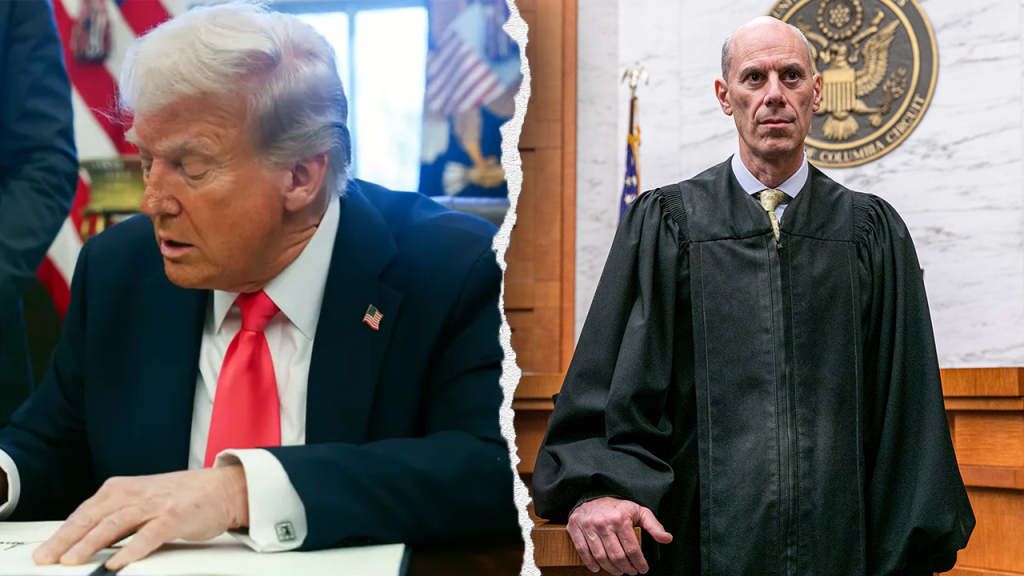In a significant legal development, U.S. District Court Judge James Boasberg has issued a temporary restraining order against an attempt by the Trump administration to deport Venezuelan nationals under an antiquated wartime law. This move follows a lawsuit filed by organizations including Democracy Forward and the ACLU, which argued that such deportations would cause irreparable harm. The order halts deportations for two weeks, while officials from the Trump administration, including border czar Tom Homan, have announced their intent to proceed with deportations despite the ruling.
| Article Subheadings |
|---|
| 1) Legal Background of the Alien Enemies Act |
| 2) Implications of Judge Boasberg’s Ruling |
| 3) Administration’s Response to the Ruling |
| 4) Previous Actions of Judge Boasberg |
| 5) Future Legal Challenges Expected |
Legal Background of the Alien Enemies Act
The Alien Enemies Act, passed by Congress in 1798, grants the President the authority to deport noncitizen individuals during times of war. Over the years, this law has rarely been invoked, with its most notable applications during periods of major conflict, such as the War of 1812, World War I, and World War II. Critics of its current invocation argue that America is not in a state of war with Venezuela and that the use of this law to justify deportations now is an overreach of executive power. The plaintiffs, including organizations like the ACLU, contend that this application of the law is inappropriate given that no current predatory incursion from Venezuela threatens the United States.
Implications of Judge Boasberg’s Ruling
Judge Boasberg’s decision to grant a two-week temporary restraining order has important implications for the Trump administration’s immigration policies. By halting the deportation actions, the judge has provided the court with crucial time to assess whether these alleged deportations are lawful. The ruling was prompted by fears that deportations could cause “imminent and irreversible harm” to individuals facing removal. The plaintiffs effectively argued that the deportations would not only violate legal norms but could also endanger the lives of vulnerable populations, including those who might face persecution if returned to their home country.
Administration’s Response to the Ruling
In reaction to Judge Boasberg’s order, administration officials, including border czar Tom Homan, expressed their unwavering commitment to continue deportations. Homan publicly lambasted the ruling, stating, “We are not stopping,” and described the legal battle as just another skirmish in an ongoing fight against illegal immigration. The administration had already begun deportations before the state-of-the-art order was issued, with officials claiming that planes carrying deported migrants had already left U.S. airspace by the time the order was enacted. White House press secretary Karoline Leavitt defended the administration’s actions, asserting that the order lacked lawful basis and contending that the broad use of the Alien Enemies Act was justified based on national security.
Previous Actions of Judge Boasberg
Judge Boasberg is not new to high-stakes legal battles. Appointed by former President Barack Obama, he has a history of presiding over cases that have attracted considerable attention, including issues related to national surveillance and federal law enforcement. As the presiding judge of the Foreign Intelligence Surveillance Court (FISA) between 2020 and 2021, Boasberg oversaw significant aspects of security-related court proceedings. His past rulings have often been scrutinized in relation to their impact on civil liberties and executive abuse of power, which may have set the stage for the current examination of the Alien Enemies Act.
Future Legal Challenges Expected
The landscape of legal challenges against the Trump administration’s immigration policies is poised for further intensification. With Trump having issued over 200 executive orders since taking office for his second term, each of these actions has faced increasing scrutiny from various litigants and interest groups. The ongoing battle over the use of the Alien Enemies Act may pave the way for even more lawsuits focusing on the extent of presidential powers during periods of perceived national emergencies. Legal experts predict that additional rulings will emerge as courts navigate the complex interplay of executive authority, individual rights, and national security concerns. The implications of such cases could reverberate through future administrations, influencing how they address immigration policy and deportation practices.
| No. | Key Points |
|---|---|
| 1 | Judge Boasberg temporarily blocked the deportation of Venezuelan nationals using the Alien Enemies Act. |
| 2 | The Trump administration has vowed to continue deportation efforts despite the ruling. |
| 3 | The Alien Enemies Act has only been invoked sparingly in U.S. history. |
| 4 | Judge Boasberg previously oversaw significant cases related to national security. |
| 5 | More legal challenges against immigration policies are expected in the future. |
Summary
The recent ruling by Judge James Boasberg marks a pivotal moment in the ongoing immigration policy debate shaped by the Trump administration. With the invocation of the Alien Enemies Act under instant scrutiny, the legal ramifications extend far beyond this case, potentially influencing the administration’s ability to enact its broader agenda. As both legal and political challenges persist, this situation emphasizes the continuing dialogue regarding the limits of executive power, particularly in the delicate realm of immigration enforcement.
Frequently Asked Questions
Question: What is the Alien Enemies Act?
The Alien Enemies Act is a law enacted in 1798 that allows the President to deport noncitizens deemed a threat during times of war.
Question: How has the Trump administration responded to legal rulings against its immigration policies?
The Trump administration has consistently pushed back against legal rulings, often expressing a determination to continue its policies despite court rulings against them.
Question: What kind of impact could Judge Boasberg’s ruling have on future immigration policy?
Judge Boasberg’s ruling could set a precedent that limits the administration’s ability to rapidly deport individuals based on the Alien Enemies Act, influencing how future cases are handled in the courts.
